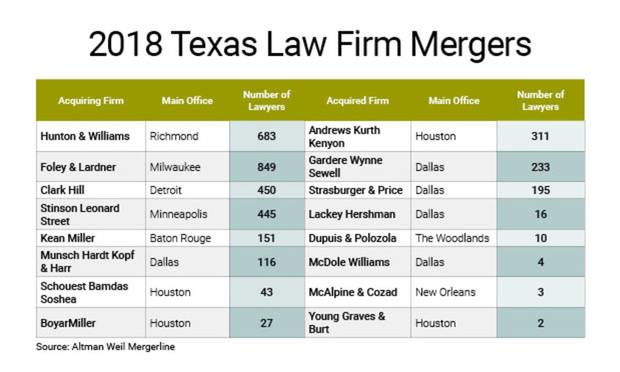Texas Merger Mania Should Continue in 2019, Consultants Say
At least eight U.S. law firm mergers in 2018, including three of the five largest, involved Texas firms, according to Altman Weil's MergerLine.
January 22, 2019 at 06:31 PM
6 minute read
 Roschetzky Photography/Shutterstock.com
Roschetzky Photography/Shutterstock.com
Texas law firms were involved in at least eight mergers in 2018, including three of the five largest, and consultants who work in the Texas market expect a similarly active market in 2019, as the lure for top-notch laterals and the robust Texas market continues unabated.
“I would expect the merger trend to absolutely continue—a continued uptick nationally, quite frankly—but you will see that phenomenon in Texas right now,” said Gary Miles, president and chief executive officer at Miles Partner Placement in California.
Miles said the increasing separation between the haves and the have-nots, in terms of profitability, is driving more law firms, even those with strategic plans to remain independent, to consider mergers.
“It used to be smaller firms would look to be acquired or merge,” he said, but now shops of all sizes are considering combinations. “Now there's a myriad of conditions where I think law firms start to say …, 'Do we need a larger platform?'”
The eight law firm mergers involving Texas firms in 2018 were among 106 combinations announced in the United States, according to information compiled by Altman Weil MergerLine. That's the highest total Altman Weil has seen since 2007, when the consulting company began compiling merger information.

“Almost everybody is a potential acquirer or an acquisition target in 2019—we have never seen so many law firms in play,” Altman Weil principal Tom Clay wrote in a report on the 2018 merger numbers.
He wrote that large and midsize firms are merging to obtain more market share with clients, to add or enhance practices, or to expand their strength in a market with high potential. He wrote that small firms are more likely to be “acting defensively,” merging based on concerns about the long-term life of the firm, a need for more capital, or as succession strategy.
Deals of All Sizes
The merger activity in Texas was exceptional in 2018 because of the size of the deals. According to Altman Weil MergerLine, acquisitions of firms with 21 or more lawyers made up only 20 percent of the combinations industrywide.
The largest merger of 2018 involved 900-lawyer Bryan Cave and 666-lawyer Berwin Leighton Paisner, a U.K. firm. But the next three largest mergers involved Texas firms: Houston-based Andrews Kurth Kenyon's merger with Hunton & Williams, creating the 1,000-lawyer Hunton Andrews Kurth; Dallas' Gardere Wynne Sewell's combination with Foley & Lardner, creating a 1,100-lawyer firm known as Foley Gardere in Texas; and Dallas-based Strasburger & Price's merger with Detroit's Clark Hill, creating a 650-lawyer firm known as Clark Hill Strasburger in Texas.
The other five mergers involving Texas firms and tracked by Altman Weil MergerLine included one at year-end: Houston-based BoyarMiller's acquisition of Young, Graves & Burt and two of its lawyers.
Miles said the ongoing merger activity reflects Texas' very active lateral hiring market, as firms compete to hire laterals and keep their existing rainmakers at the same time. He suggests that any firm of 400 lawyers or fewer is at the least thinking about what it needs to do to compete, and a merger is one possibility.
Kent Zimmermann, a consultant with Zeughauser Group who has worked on a number of big Texas mergers, including the Hunton & Williams/Andrews Kurth Kenyon deal, and the Foley & Lardner/Gardere Wynne Sewell combination, said the heated competition for talent has prompted firms in Texas and elsewhere to “revisit” their strategic plans.
They're asking “what options should be on the table to achieve their aspirations?” Zimmermann said. “So more and more firms in Texas and elsewhere are coming to the conclusion they should not have their eyes closed to the possibility of a combination if it helps them get where they want to be.”
Zimmermann said he expects more deals in Texas in 2019, simply because the market is becoming more competitive for high-quality talent.
“In many competitive markets, including Texas, there's not enough people to go around or [enough of] certain types. Many firms talk about a shortage of high-quality associates in Dallas and Houston, midlevel associates. That part is consistent with the increasing demand,” he said.
Chris Batz, owner of The Lion Group in Kansas City, Missouri, said firms are continually trying to get into Texas, as evidenced by the number of out-of-state firms opening offices in Texas. A merger is one way of entering a market, he noted, and he expects some Texas mergers this year, even an “across-the-pond” merger if it makes business sense.
Batz said the big question is whether the Texas legal market has reached the “exhaustion point” for mergers. He said Texas isn't there yet.
Three weeks into the new year, there's already been a merger: Munck Wilson Mandala, a technology-focused firm based in Dallas, added an office in Los Angeles by merging with Hecker Law Group, an intellectual property and entertainment law boutique.
Meanwhile, firms continue to open offices in the Lone Star State, including Bradley Arant Boult Cummings, which opened an office in Dallas with eight lawyers from Sayles Werbner and also acquired Rogaliner Law Firm and its two lawyers. Missouri firm Lathrop Gage also opened an office in Dallas, hiring a group of toxic tort lawyers from Hawkins, Parnell Thackston & Young last week.
In explaining the move, Lathrop Gage's managing partner, Cameron Garrison, expressed what seems to be a popular sentiment. “Dallas is a market we have had an eye on for a long time,” he said.
Further Reading:
It's Official: Andrews Kurth and Hunton & Williams Will Merge
Foley & Lardner to Merge With Dallas-Based Gardere
Strasburger & Price Merges with Clark Hill
Houston's BoyarMiller Adds Estate, Probate Practice With Young, Graves & Burt Deal
What's So Hot About Texas? For Law Firms, Apparently Everything
Midwest Firm Lathrop Gage Launches Dallas Office, Hiring Seven Litigators
Bradley Arant Opens Dallas Office with Dick Sayles, Eight Others from Sayles Werbner
Munck Wilson Adds LA Office in Merger With IP Boutique Hecker Law Group
This content has been archived. It is available through our partners, LexisNexis® and Bloomberg Law.
To view this content, please continue to their sites.
Not a Lexis Subscriber?
Subscribe Now
Not a Bloomberg Law Subscriber?
Subscribe Now
NOT FOR REPRINT
© 2025 ALM Global, LLC, All Rights Reserved. Request academic re-use from www.copyright.com. All other uses, submit a request to [email protected]. For more information visit Asset & Logo Licensing.
You Might Like
View All
Jones Day Names New Practice Leaders for Antitrust, Business and Tort Litigation and Latin America


Haynes and Boone Expands in New York With 7-Lawyer Seward & Kissel Fund Finance, Securitization Team
3 minute read
'None of Us Like It': How Expedited Summer Associate Recruiting Affects Law Students and the Firms Hiring Them
Trending Stories
- 1States Accuse Trump of Thwarting Court's Funding Restoration Order
- 2Microsoft Becomes Latest Tech Company to Face Claims of Stealing Marketing Commissions From Influencers
- 3Coral Gables Attorney Busted for Stalking Lawyer
- 4Trump's DOJ Delays Releasing Jan. 6 FBI Agents List Under Consent Order
- 5Securities Report Says That 2024 Settlements Passed a Total of $5.2B
Who Got The Work
J. Brugh Lower of Gibbons has entered an appearance for industrial equipment supplier Devco Corporation in a pending trademark infringement lawsuit. The suit, accusing the defendant of selling knock-off Graco products, was filed Dec. 18 in New Jersey District Court by Rivkin Radler on behalf of Graco Inc. and Graco Minnesota. The case, assigned to U.S. District Judge Zahid N. Quraishi, is 3:24-cv-11294, Graco Inc. et al v. Devco Corporation.
Who Got The Work
Rebecca Maller-Stein and Kent A. Yalowitz of Arnold & Porter Kaye Scholer have entered their appearances for Hanaco Venture Capital and its executives, Lior Prosor and David Frankel, in a pending securities lawsuit. The action, filed on Dec. 24 in New York Southern District Court by Zell, Aron & Co. on behalf of Goldeneye Advisors, accuses the defendants of negligently and fraudulently managing the plaintiff's $1 million investment. The case, assigned to U.S. District Judge Vernon S. Broderick, is 1:24-cv-09918, Goldeneye Advisors, LLC v. Hanaco Venture Capital, Ltd. et al.
Who Got The Work
Attorneys from A&O Shearman has stepped in as defense counsel for Toronto-Dominion Bank and other defendants in a pending securities class action. The suit, filed Dec. 11 in New York Southern District Court by Bleichmar Fonti & Auld, accuses the defendants of concealing the bank's 'pervasive' deficiencies in regards to its compliance with the Bank Secrecy Act and the quality of its anti-money laundering controls. The case, assigned to U.S. District Judge Arun Subramanian, is 1:24-cv-09445, Gonzalez v. The Toronto-Dominion Bank et al.
Who Got The Work
Crown Castle International, a Pennsylvania company providing shared communications infrastructure, has turned to Luke D. Wolf of Gordon Rees Scully Mansukhani to fend off a pending breach-of-contract lawsuit. The court action, filed Nov. 25 in Michigan Eastern District Court by Hooper Hathaway PC on behalf of The Town Residences LLC, accuses Crown Castle of failing to transfer approximately $30,000 in utility payments from T-Mobile in breach of a roof-top lease and assignment agreement. The case, assigned to U.S. District Judge Susan K. Declercq, is 2:24-cv-13131, The Town Residences LLC v. T-Mobile US, Inc. et al.
Who Got The Work
Wilfred P. Coronato and Daniel M. Schwartz of McCarter & English have stepped in as defense counsel to Electrolux Home Products Inc. in a pending product liability lawsuit. The court action, filed Nov. 26 in New York Eastern District Court by Poulos Lopiccolo PC and Nagel Rice LLP on behalf of David Stern, alleges that the defendant's refrigerators’ drawers and shelving repeatedly break and fall apart within months after purchase. The case, assigned to U.S. District Judge Joan M. Azrack, is 2:24-cv-08204, Stern v. Electrolux Home Products, Inc.
Featured Firms
Law Offices of Gary Martin Hays & Associates, P.C.
(470) 294-1674
Law Offices of Mark E. Salomone
(857) 444-6468
Smith & Hassler
(713) 739-1250






